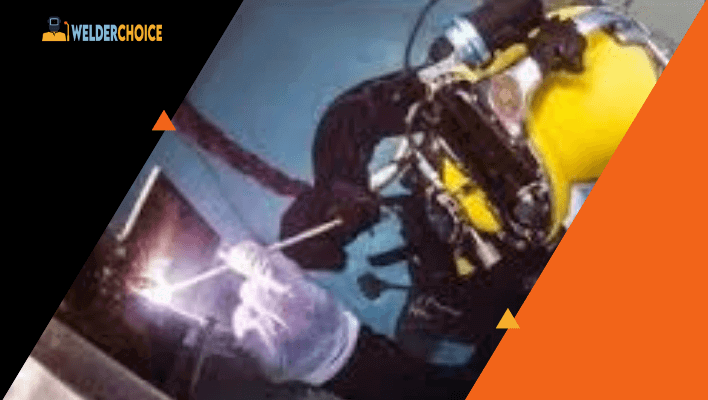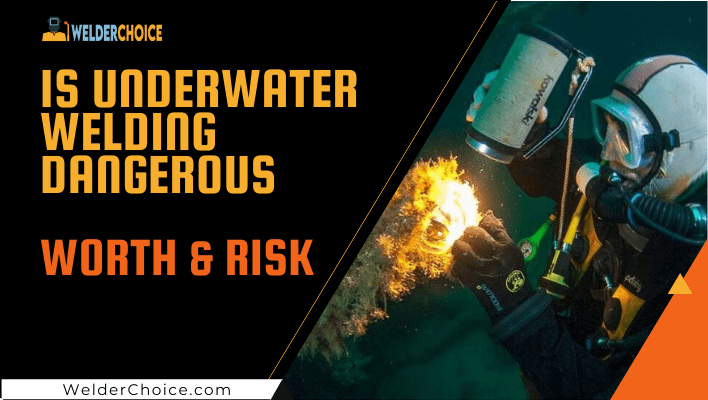Is Underwater Welding Dangers? a most common question people ask.
Underwater welding is recognized as a highly specialized field. The field of commercial diving is in high demand. You can make a lot of money and have a lot of job alternatives as a commercial diver.
Underwater welders construct, survey, and maintain structures in both freshwater and saltwater.
Despite the fact that the demands of the job can be fairly hard and the risks can be numerous, underwater welding can be a very rewarding vocation. Let’s look at some of the risks associated with commercial diving.
Risks From Being A Commercial Diver
One of the most important risks for underwater welding is commercial diving. While diving, a welder faces the risks of hypothermia, drowning, and decompression sickness, often known as “the bends.”
We don’t want to come across as pessimistic, but it’s important to be aware of the risks. The risks of becoming a commercial diver are outlined here, but keep reading to learn why they’re so dangerous, how they happen, and what happens if they happen:
- Decompression sickness.
- hypothermia
- drowning
- eletrocution
1. The Bends / Decompression Sickness
Decompression sickness occurs when a diver ascends from deep water too quickly. This technique must be carried out in a step-by-step manner. A change in bodily pressure causes it to happen.
The nitrogen in the diver’s air supply can really bubble if the pressure in their tank is released too quickly. It can enter the diver’s bloodstream, causing memory loss, impaired judgment and reasoning, and, in extreme cases, paralysis or death.
2. Hypothermia
Hypothermia is another concern that could arise. The temperature is always lower underwater than it is above the surface. The diver’s body is exposed to significantly cooler temperatures in large bodies of water, whether inland or offshore.
The cool water conducts heat away from the body. The loss of heat can cause metabolism problems or even organ failure if the body is kept too chilly for too long.
A well-insulated rubber wetsuit can help protect the body against extreme cold.
3. Drowning
Even the most experienced divers must be aware that drowning is a serious threat. Even if a diver is wearing a wetsuit and has an air tank attached, this can happen.
One explanation is that the equipment is old and in need of repair. Another instance is when a diver gets tangled up among underwater obstacles. It becomes increasingly difficult to see as you walk deeper into the cave. At times, underwater welders may become caught in the lines of their own equipment.
Make sure your equipment is in good working order and that nothing is malfunctioning or unsealed before diving, especially for wet welding. Ensure that your air supply tank is fully charged.
Drop your diving weights if you become entangled to gain some buoyancy that will help you pull yourself up and out of the situation.
Is Underwater Welding Worth It?
Underwater welding is, in fact, a lucrative career choice. It does, however, have the same risks as any other professional work. Before you fall in love with this career choice, make sure you weigh the advantages and disadvantages to see if it fits into your current lifestyle.
The three main reasons you should avoid a job in commercial diving or wet welding are as follows:
1. Costs Of Training
Training is not inexpensive, which may prevent many first-time welders. Make sure to inquire about the certifications offered by your commercial diving school as well as the cost of your tuition.
2. Flexibility In The Workplace
Many welder-divers aren’t used to the commercial aspect of welding underwater and may choose for the more adventurous choice. This usually corresponds to a greater compensation, but it might be challenging if you also have other responsibilities, such as family commitments.
3. Age And Skill
Many people believe that the younger someone is, the better, but this is just not the case. The fact that the majority of underwater welders are under the age of 30 should not dissuade more experienced welders from taking part.
Underwater Welding Death Rate
Surprisingly, only a small number of deaths have been attributed to underwater welding. Contrary to popular belief, water and electricity do not cause many deaths. In fact, there has only been one reported case of a welder dying as a result of a direct link between welding and being underwater.
An incident occurred in the Deep Sea Diving School in 1943. As you can see, this was a long time ago, and since then, safety and equipment have only become better. Underwater welding jobs are therefore far safer than most people think, and even safer than more common vocations.
In general, welding poses a number of safety concerns, however underwater welding has a very low death rate. It’s worth to note that some welders perish underwater for reasons unrelated to welding. These aren’t taken into account in official statistics.
Commercial Divers’ Risks and Hazards
Underwater wet welding can be done on land, in lakes, rivers, and ponds, or in the ocean. Both places have their own set of risks for the welder.
Inland work frequently necessitates the usage of freshwater. Freshwater welders work in shallower seas, whereas saltwater welders work in deeper waters. Freshwater has greater water currents at shallower depths. The diver must use more energy to stay in place. As a result, your welding arc could possibly deviate.
Saltwater or ocean welders must compensate for the buoyancy of saltwater in order to operate in deep water. As a result, the diver is required to bear additional weight, which can be nearly equal to his own. As a result, the pressure on the body increases.
In all cases, divers are working with hazardous equipment in a dark environment. Auxiliary lighting may be carried, but your welding arc is your only source of light.
Plant life, rocks, and reefs, as well as the object being welded, form a range of barriers beneath the water’s surface. Such obstructions are difficult to see in murky seas, making it simpler for a diver’s air hoses to become entangled.
Risks of Electrocution and Explosion

Underwater wet welding operators use electricity and flame from heavy welding equipment. As a result, there is a risk of burns and electric shock. Malfunctioning equipment is a common cause of electrocution.
In Freshwater, the welding arc is typically uneven and unstable, and it does not make firm contact with the metal being welded. If the diver is unskilled with dealing with the arc and effectively securing the weld, the risk of electric shock is significant.
Workers who work in deeper water face more risks than those who work in shallower waters. The risk of explosions is higher in offshore underwater wet welding settings due to the volume of fuel stored on offshore oil rigs and marine vessels.
Compressed gases can also produce uneven arc behavior in a dry chamber weld, increasing the risk of electric shock or explosion.
Specialized Training
Underwater welders must have special training in order to work in these dangerous circumstances. This training teaches you how to follow safety rules for your own safety.
According to various studies, physically active divers are better equipped to withstand the health risks of underwater welding. Being in shape, consuming enough of water, and avoiding alcohol are all ways to achieve physical fitness.
Many workplaces need certification of “fitness for duty” or proof of good health. This is normally done before you start working and continued throughout your career. It’s a great way for both you and them to make sure you’re up to the physical demands of the work.
The majority of businesses that use commercial welders place a premium on safety. Employees are also required to complete a certain amount of hours of safety training. Welders that work underwater are never alone when diving.
Prior to any underwater welding activity, diver tenders assist in the preparation of diving and welding equipment.
Alternating divers is an effective preventative technique because no one needs to stay underwater for an extended period of time. Decompression chambers are another approach to avoid the bends.
Hyperthermia can be avoided by wearing insulated diving gear and spending as little time underwater as possible. To avoid becoming entangled in things, divers should utilize diving lights and observe safety precautions.
Companies that do underwater welding are gradually confining the area to be welded with more modern methods. In freshwater, a pit or a pen (also called as a cofferdam) can be secured to the work structure with sealed clamps.
The water is drained away, leaving the welder in a dry atmosphere. In deep water, a full or partial hyperbaric welding chamber is also devoid of water. These have life-support systems and a dry working environment for the welder.
Is it all worth?
Underwater welders work in a potentially risky environment with huge equipment specialized for underwater welding. It should go without saying that this type of action is extremely dangerous.
Welders are paid more for this type of welding because it requires such specialized training and skillsets, as well as a high level of danger. The majority of skilled water welders are hired on a project basis.
The amount they are paid is mostly dependent by the climate in which they will be diving, the project’s depth, the diving style used, and the type of welding required.
According to the American Welding Society, underwater welders can make between $100,000 and $200,000 per year.
What Are the Requirements for Welding Underwater?
FAQs
Is it possible to die while welding underwater?
Yes, underwater welding has the potential to kill you. Two prevalent causes of death are drowning and electrocution. Every year, about 10-15 people die in the field.
Underwater welding claims the lives of how many people?
Approximately 10-15 people die each year. This amounts to approximately.015 percent to.022 percent with over 6,500 underwater welders.
Is it worth to invest in underwater welding?
Working as a welder underwater is usually worth. Although the high pay is the most enticing feature of the job, it does come with risks that must be considered.
How long can a welder work underwater?
Underwater, the average welder’s lifespan is comparable to that of the general public. Despite the risks, the low death rate of 15 per 10,000 underwater welders has only a negligible impact on average life expectancy.
Is welding underwater a worth idea?
Underwater welding is a fulfilling career that pays well and comes with a lot of bonuses. It’s dangerous since there’s a chance of harm or death.
How long do you think you’ll be able to work as a water welder?
You can weld underwater for as long as you’re physically fit, which is typically 35-40 years if you begin after high school and continue until you’re 55.
What certifications do I need to work as an underwater welder?
To operate as an underwater welder, you’ll need the following skills:
- GED high school
- Underwater Welding Certification
- Commercial Diving Certification
Conclusion
Underwater welding offers the opportunity for adventure, travel, and a decent wage. Jobs in underwater welding provide a wide variety of wages.
It can, however, be more profitable than welding only on dry land due to the training necessary, the environment in which they work, and the level of risk involved.
